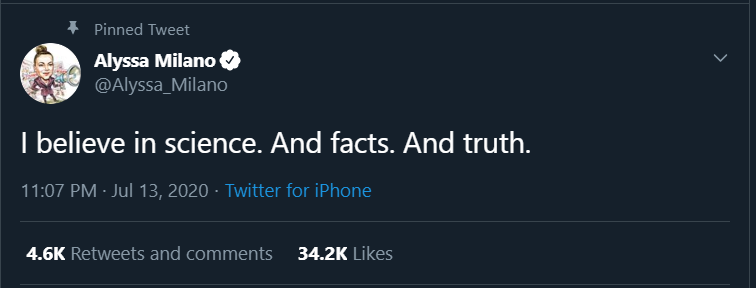
I do not believe in science.
In the modern age that is admitting to being uneducated and irrational. This shows how little the modern age knows about science.
Let me list other things I don’t believe in:

My number #5 that belonged to my father, which I have restored to use as a jack plane.
The Mitsubishi Outlander Sport C. named Lola which is my primary vehicle.
The Acer laptop I am using to post this.
The Perl programming language with which I pay my bills.
Of course you don’t believe in those items, those are tools.
That is correct. They are tools, but that is all science is. Science is a tool used to understand the nature and behavior of the material world. Much like a good hand plane, it has proved to be the most useful at its designed task, in case gaining such understanding. It allows us to answer perplexing questions with greater depth over time. It allows us to create models of reality so that engineering can be done with greater precision towards a given end instead of by rules of thumb. There is nothing to believe in when it comes to science, there are processes to use, models to apply, and discoveries to view with wonder.
Fine, but that’s not what I mean. I mean, I believe what scientists say is true.
Ah, so you are approaching science as a form of faith whose priests are scientists defined as someone having an advanced degree from a university and who wear lab coats as the raiment, and whose revealed truth are the accepted best theories around a question.

Scratch that, you accept the most recently popularized revelation, not the most recent one received by priests of science. That is, if you even get that far. There are many popular book level discussions of both general and special relativity, yet I have yet to meet a science believer who spouts the equations of either when asked about motion. They give Newton’s laws in Newtonian form, not even LaGrange’s formulation. Don’t worry, I do the same. Newton’s answers are a subset of relativity and a subset is more than sufficient at the level of accuracy day-to-day life needs. Most of us are not travelling at sufficient speeds or receiving sufficient acceleration to make the differences measurable by common instruments. Not that we do not experience such differences. Experiments using matched atomic clocks on the ground and on jet airlines in tests of special relativity, to measure effects on elapsed time, have confirmed those effects.
That sublimation of Newton’s work into Einstein’s is exactly what I meant when I said science gives understanding “with greater depth over time”. It is not that Newton was wrong. It was just that he showed us a sliver. In time it is possible, perhaps probable given the difficulty physicists have had trying to unite gravity, the macro force, with quantum field theory, the micro forces, the work of some future scientist will subsume Einstein’s work.
This process puts belief in the outcomes of science on rocky ground. It means accepting your beliefs will have to change as they are proved wrong. That effort to prove wrong, either directly incorrect or merely a subset of some broader understanding, is at the heart of science. If there is anything that could be construed as a legitimate belief in science, it would be a belief in the value of skepticism. A proper scientist is skeptical of answer, with that skepticism decreasing with repeated successful experiments. Science is not about belief, but empirical results.
Fine, isn’t that what people mean when they say “they believe in science”? Besides, even if it isn’t what’s the problem with believing in the results of experiments?
Let’s answer the second question first. The problem is the power of belief and the unwillingness to change it. Instead of trying to explain that danger, let me turn you over to Chris Rock and Kevin Smith (link because YouTube did not allow embedding I found and fixed the embedding issue).
I just think it’s better to have an idea. You can change an idea; changing a belief is trickier. People die for it, people kill for it. The whole of existence is in jeopardy right now because of the Catholic belief system in this Plenary Indulgence bullshit. Bartleby and Loki, whether they know it or not, are exploiting that belief, and if they’re successful, you, me, all of this ends in a heartbeat. All over a belief.
To use a topical example, CNN ran this story that masks are unnecessary. Now, they have this story that masks are vital. We have a nation in two warring factions. One says science insists we must all wear masks based on SCIENCE. On the opposite side are those pointing to studies that say masks are not helpful or even harmful and refuse to wear them. In between are most of us who don’t know what to believe, although a decent number of people distrust individuals like Dr. Fauci who had admitted to initially lying about masks to preserve the supply for medical personnel.
If people understood that science allows us to answer perplexing questions with greater depth over time instead of believing in it, I suspect we’d have a much more uniform view on masks. Instead, the sides fight with their various holy texts, i.e., scientific studies. We cannot use the tool to build a safer world, because we believe in a revealed truth instead of applying a dose of skepticism. Those attitudes indicate that the answer to the first question, people who say they believe in science mean they believe in its utility as a tool to discover, is no.
Masks during COVID would seem to be a trivia disagreement, but failure carries legal penalty and has resulted in multiple acts of violence. Now apply this faith in science to the discussion of climate change where even someone who accepts the reality of anthropomorphic global warming, just not on a catastrophic scale, is labeled a denier. Denier is a lot closer to heretic, a religious term, a term based in belief, than it is to skeptic, a term rooted in the ideals of science. This, in an ironic way, mixes well with the definition of scientist given above requiring a university degree. After all, the university began as an institution that taught law, medicine, and theology. If you don’t think denier is religious, there have been calls to execute global warming deniers. That’s not on Alex Jones’s show, either. That’s in Talking Points Memo among others. Those are all very mainstream.
Plus, there is the issue of revealed faith. As I said, Dr. Fauci admits to lying about masks, for a noble purpose of course. Scientists are people and like people they can lie and falsify things to achieve their goals. I find it curious in an age where religious texts are found to be unreliable because men wrote them, scientific studies have the power of revealed truth the Bible had for centuries.

Instead of a belief in science, I suggest you develop two things. One is the aforementioned skepticism. The second is a strong sense of delight in a better answer. Instead of feeling superior to Tycho Brahe because he wasn’t as close to the truth about the motion of the Earth as Galileo, marvel at his precise collection of the most accurate data of planetary motion to that point in history. Look at how much more in tune with observation, and thus better science, his model with all the planets except the Earth orbiting the Sun, which he had orbiting the Earth, was than Galileo’s model. Then marvel at how Kepler, taking the same observations and applying one tiny bit of skepticism, questioning the need for the orbits of planets to be circular, lead to the modern model of the solar system.
If you want to honor science, don’t believe in it, but be able to say, being honest to yourself, you’d have accepted Tycho over Galileo because of how well he matched observation, but you would have the courage to challenge assumptions that Kepler brought to the same data set to get a better answer.


There’s reason to suspect Milano could not pick any of the three out of a line up.
You’ve heard my thoughts before on the magical thinking and most common religious expression of modern times.
When I was a kid, I thought science was something I could learn the whole of if I just read the right books. Well, first I hit diminishing returns on the children’s nonfiction section. Then I noticed how thin the adult section of the public library was. Around then, I realized that modern physics might be building castles in the clouds, and that I didn’t see any reason to care about any of it.
It takes effort to even learn what people in a field actually think, much less figure out if anyone is even usefully correct. It’s like sitting down at a poker table not knowing who the sucker is. If you don’t assume that you will learn stuff by trying to figure out where people in the field disagree, and then try to figure out who is more correct and who is more wrong, you aren’t serious about knowing that the science actually is.
Some fields are probably still wrong, but look like they might be converging on correct, slowly. Other fields appear to actually be diverging.
Anyone who tries to consume this stuff as if it is a uniformly trustworthy whole has no clue what they are dealing with.
I doubt she can either. That’s one reason I choose her post. In this one tweet she shows the magical thinking I think underlies believers in science.
As for utility, that is something we only discover after we apply it or, if we are in a small group, we are the person who finds the application. What is open is the ability to see wonder. Not every field will create wonder in every person, but if someone looks I suspect everyone can find one that inspired wonder in them.
Regarding Physics, I remember learning in high school about the elementary particles. A proton is a positively charged particle of substantial mass (compared to an electron). An electron is a negatively charged particle of negligible mass (compared to a proton). A neutron is a proton-sized particle with no charge–easy enough to imagine it was a combination of a proton and electron where the charges cancelled out and the mass was only negligibly different. Atom smashing would result in different particles that made up those formerly thought atomic. When they got to the neutrino–a particle with no mass and no charge. that’s when I said, “Now you’re just making stuff up.” Indeed the genesis of the neutrino was a fudge factor because without it Einstein’s equations didn’t work out quite right. Similar to the Hubble Constant, sometimes laughably referred to as the Hubble Variable by astronomers because it has changed so much over the decades.
Dark matter I can believe in. Makes sense that we can’t see all the matter in the universe. Don’t get me started on dark energy though. More twiddling to make the equations come out right.
The neutrino, and some other members of the particle zoo, are to be the best argument for some aspects of post modernism. It was introduced just to make sure spin was conserved. Yet, finally experiments “found it”, that is they observed something that behaved as predicted for the neutrino.
So, did the neutrino exist a priori or was it “created” by introducing it and then looking for it. While I am firmly in the former camp, sometimes you wonder.
Of course, the mass of the neutrino spent a lot of time fluctuating between zero and some positive value. At one point, the non-zero mass neutrino was a leading dark matter candidate.
That said, I’m a little more relaxed about this things that fall out of equations for a few reasons. First, physicists themselves are not comfortable with them and people spend time looking for better answers. Second, sometimes their variability, such as Hubble’s Constant are more a product not of being wrong about what is happening, but instrumentation whose ability is well behind theory. Third, every now and then they just turn out to be observable. Not only the neutrino has done this, but Einstein’s cosmological constant now appears to be non-zero based on the first mass observation of Type I supernovas by Hubble, giving the first solid values for them as a standard candle (which in turn affected Hubble’s Constant as we started to get data at the same level as theory).
If more of the faiths called “science” were this honest about its short comings and had this consistent a history of searching for better data to build better theories, in physics going back to at least Galileo (on motion) and Tycho (and astronomy) I’d trust it a lot more.
Exactly right and to your point. The science is never settled. It is difficult though even for scientists to maintain the concept that they are working with models that work for the moment. After a while it’s easy to forget that another model might work better. After all, Newton wasn’t wrong, he was just describing a “special” case of quantum mechanics–the one that we see without our new amazing instruments where the quantum levels all blend together.
I remember as a freshman in college mentioning casually to another student that the atomic theory was just that, a theory, which could eventually be replaced by a better theory. He was appalled. He had seen pictures of the Bohr model for atoms in textbooks and was convinced that these were photographs. Pointing out that it’s impossible to photograph something smaller than the wavelength of visible light was useless. He had seen pictures, and he believed.
Most of the people who call themselves “scientists” don’t want to search new answers, they just want to defend the answers they’ve already adopted.
“Cancel culture” was a thing in the scientific community long before the SJWs adopted it. Step outside the currently-accepted Narrative, and you were reviled and probably unemployable.
I could swear there was a Notebooks of Lazarus Long quote on that one. Something about most scientists being bottle washers and button counters.
[clickety] Yep. I think he was optimistic; most modern scientists wouldn’t be caught doing anything as useful as washing a bottle.